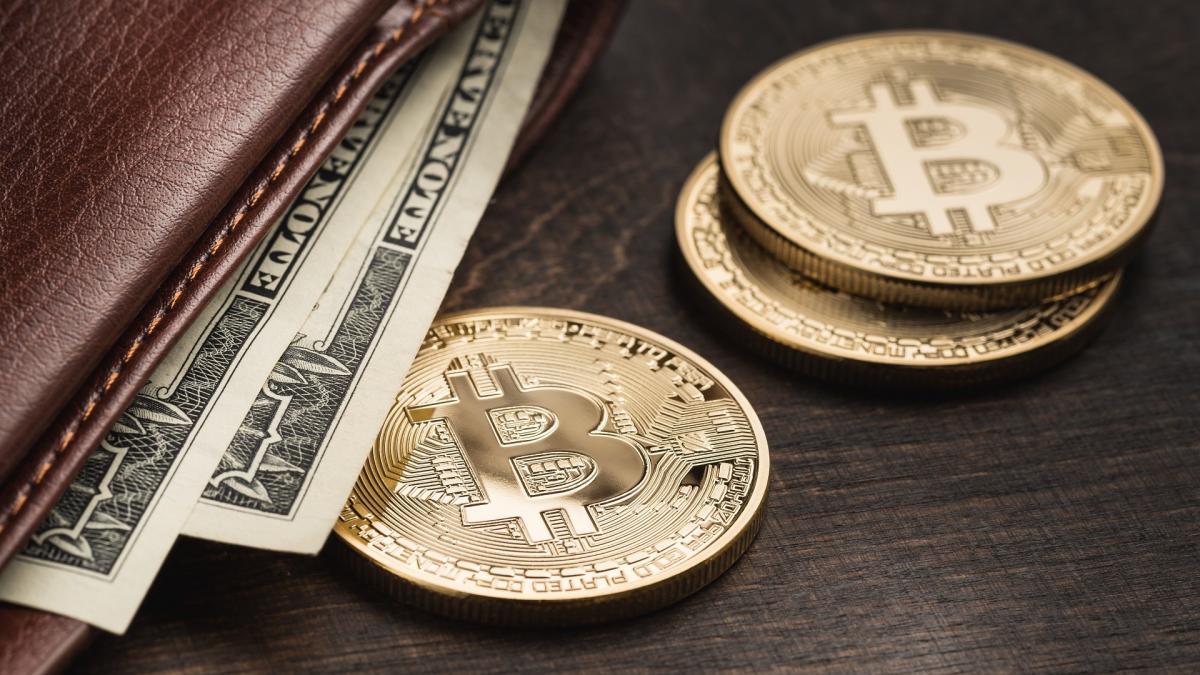Bitcoin (BTC) is a pioneering decentralized cryptocurrency in peer-to-peer payments. With a market capitalization surpassing $524 billion as of May 19, 2023, Bitcoin has attracted numerous early adopters due to its qualities of being censorship-resistant and permissionless. The number of active BTC-holding addresses has experienced a remarkable surge, reaching over 1.3 million in April 2021, a significant increase from the mere 1,000 addresses recorded in July 2010. As the popularity of Bitcoin proceeds to soar, the security of digital assets becomes paramount for all users, regardless of their portfolio size. We offer a wallet that prioritizes privacy when storing Bitcoins, utilizing advanced encryption methods such as private key encryption, PINs, and biometric authentication. Bitcoin's allure has captivated investors and enthusiasts drawn to its decentralized framework and the potential for substantial returns. A common inquiry arises among the diverse range of Bitcoin wallets available: What is the richest Bitcoin wallet?
Who Owns the Most Bitcoin?
The ownership of Bitcoin is a topic of great interest, and understanding the distribution of the cryptocurrency is essential to explore who owns the most Bitcoin. Bitcoin has a maximum supply cap of approximately 21 million coins, set when it was created in 2009. Currently, the circulating supply of Bitcoin is around 19.37 million. The creation of new Bitcoins is limited through a process known as halving, which occurs approximately every four years. Halving lessens the rate at which new Bitcoins are produced, leading to a gradual slowdown in mining. As a result, the remaining Bitcoins will be mined gradually until the year 2140. It's worth noting that many Bitcoins are believed to be permanently lost. An estimated four million Bitcoins have been lost since the cryptocurrency's inception due to forgotten passwords, misplaced storage devices, or accidental disposal.
The pseudonymous founder, Satoshi Nakamoto, is a significant figure when considering who owns the most Bitcoin. Nakamoto is believed to have been the first miner of Bitcoin and accumulated over 1 million Bitcoins through mining rewards from mining more than 22,000 blocks in the early days. However, the true identity of Nakamoto remains unknown. This fascinating aspect of Bitcoin ownership raises curiosity about the distribution of wealth and leads to questions like: What is the richest Bitcoin wallet? Based on estimates, Nakamoto's current ownership of Bitcoin is around 1,000,000 BTC. At the May 19, 2023, BTC price of $27,074, this would be valued at approximately $27.074 billion. It's important to note that this estimation is based on assumptions and blockchain analysis, as Nakamoto has not disclosed their actual holdings. The ownership of Satoshi Nakamoto's estimated 1 million BTC is believed to be distributed across multiple wallets associated with the early blocks mined. These wallets have remained inactive for many years, sparking speculation and intrigue within the cryptocurrency community regarding the motivation behind keeping the coins untouched.

Institutional Investors and Public Companies: Driving Bitcoin Adoption
Institutional investors and public companies have been increasingly drawn to the world of Bitcoin, recognizing its potential as a digital asset. While some institutions choose to invest in Bitcoin through financial products like trusts and funds, public companies have taken a more direct approach by holding Bitcoin on their balance sheets.
● Institutional Investors
Institutional investors entering the Bitcoin market bring several potential implications. Firstly, their involvement lends legitimacy to Bitcoin as an asset class, attracting more mainstream attention and potentially driving increased adoption. Institutional investments can also contribute to price stability and liquidity in the market, reducing volatility and attracting more conservative investors. Below are two of the most well-known institutional investors in the cryptocurrency space:
1. Grayscale Bitcoin Trust (GBTC):
Grayscale Bitcoin Trust has emerged as one of the prominent players in the institutional Bitcoin investment space. It offers a way for investors to gain exposure to Bitcoin without directly purchasing and holding the cryptocurrency. The trust has a substantial amount of Bitcoin, estimated at around $17.4 billion. This makes it one of the largest holders of Bitcoin among institutional investors.
2. BlackRock's Bitcoin Investment:
BlackRock, the world's largest asset manager, has recognized the growing significance of Bitcoin and has incorporated the cryptocurrency into its investment strategies. While the amount of Bitcoin held by BlackRock is not publicly disclosed, reports indicate that a portion of the firm's $15 billion fund has been allocated to Bitcoin. This move highlights institutional investors' increasing acceptance and interest in the digital asset.
● Public Companies
These top 10 public companies have demonstrated a willingness to embrace Bitcoin and incorporate it into their investment strategies. Their substantial holdings of Bitcoin highlight their confidence in the long-term potential and value of the cryptocurrency. As these companies continue to navigate the evolving crypto landscape, their Bitcoin investments serve as a testament to the growing acceptance and recognition of cryptocurrencies as a legitimate asset class. Here's an in-depth look at the top 10 public companies and their Bitcoin holdings:
1. MicroStrategy Inc (NASDAQ: MSTR):
MicroStrategy stands out as a pioneer in the corporate adoption of Bitcoin. With a substantial holding of 129,699 BTC, the company's CEO, Michael Saylor, has been a vocal advocate for Bitcoin's potential as a store of value. MicroStrategy made headlines by converting a significant portion of its treasury reserves into Bitcoin, totaling billions of dollars. While the current value of their holdings has experienced a decline, Saylor remains optimistic about Bitcoin's long-term prospects.
2. Marathon Digital Holdings (NASDAQ: MARA):
As a crypto mining company, Marathon Digital Holdings is uniquely positioned to acquire and hold Bitcoin. With a current Bitcoin holding of 10,054 BTC, the company has recognized the potential value of Bitcoin as a digital asset. Their investment in Bitcoin aligns with their core business operations and allows them to benefit from mining rewards and potential appreciation in Bitcoin's value.
3. Coinbase Global Inc (NASDAQ: COIN):
Coinbase, one of the world's largest cryptocurrency exchanges, facilitates Bitcoin transactions and holds a substantial amount of Bitcoin on its balance sheet. With 9,000 BTC in its portfolio, Coinbase demonstrates its confidence in the long-term value and viability of Bitcoin. As a well-known player in the crypto industry, Coinbase's investment in Bitcoin further bolsters the cryptocurrency's credibility and acceptance.
4. Square Inc (NASDAQ: SQ):
Square is a company that offers financial services and mobile payment solutions. Has also ventured into the world of Bitcoin. With 8,027 BTC in their holdings, Square recognizes the potential of cryptocurrencies to transform the financial landscape. Their investment in Bitcoin aligns with their mission to provide individuals and businesses with innovative financial solutions.
5. Hut 8 Mining Corp (TSX: HUT):
Like Marathon Digital Holdings, Hut 8 Mining Corp is a crypto mining company that has embraced Bitcoin as an investment asset. With a holding of 7,078 BTC, Hut 8 Mining Corp leverages its mining operations to acquire and accumulate Bitcoin. Their strategic investment in Bitcoin allows them to diversify their revenue streams and participate in the growing crypto ecosystem.
6. Hive Blockchain (CVE: HIVE):
Hive Blockchain operates in cryptocurrency mining, explicitly focusing on Bitcoin. With a current holding of 3,091 BTC, the company demonstrates its belief in the value and potential of Bitcoin. By actively participating in Bitcoin mining and holding the acquired coins, Hive Blockchain positions itself as an essential player in the crypto mining industry.
7. NEXON Co Ltd (OTC:NEXOF):
NEXON, a Japanese video game company, has taken a unique approach by diversifying its investment portfolio to include Bitcoin. With a holding of 1,717 BTC, NEXON recognizes the potential of cryptocurrencies beyond its core gaming business. This strategic investment reflects their confidence in the long-term growth of Bitcoin and its ability to provide value in various industries.
8. Voyager Digital LTD (OTC:VYGVQ):
Voyager Digital is a Canadian crypto broker that has embraced Bitcoin as part of its investment strategy. Despite filing for Chapter 11 bankruptcy, the company still holds 1,239 BTC, indicating their belief in the long-term potential of Bitcoin. The company's involvement in the Bitcoin market showcases its commitment to providing crypto-related services to its customers.
9. Aker ASA (OTC:AKAAF):
Aker ASA, a Norwegian industrial investment company, has joined the ranks of public companies investing in Bitcoin. With a holding of 1,170 BTC, Aker ASA's chairman, Kjell Inge Røkke, has supported Bitcoin and its potential to drive positive change.
10. Meitu (HKG:1357):
Meitu, a Chinese technology company specializing in mobile software development, has diversified its investment portfolio to include Bitcoin. With a holding of 940 BTC, Meitu recognizes the value and potential of cryptocurrencies. This move aligns with the company's forward-thinking approach and willingness to explore emerging technologies and investment opportunities.
The increasing involvement of institutional investors and public companies in Bitcoin is a significant development for the cryptocurrency market. It not only brings further credibility and recognition to Bitcoin as a legitimate asset class but also helps drive its adoption and integration into traditional finance. As institutional investors and public companies continue to embrace Bitcoin, it will be interesting to observe how their investment strategies evolve and how they navigate potential risks and opportunities in the cryptocurrency market. Their involvement is crucial for the broader adoption and integration of Bitcoin into traditional financial systems, paving the way for further innovation and growth in the digital asset space.
Guide to Using the PlasBit Wallet
Our wallet is a secure digital storage solution for managing your cryptocurrency assets. This guide provides step-by-step instructions to create and use our wallets effectively. With our platform, you can securely store Bitcoin (BTC), Ethereum (ETH), Litecoin (LTC), Cardano (ADA), and various ERC20 tokens, with the option for anonymity.
Creating Your Crypto Wallet
- Visit our website and locate the "Sign Up" or "Create Account" button.
- Provide your email address to initiate the account creation process.
- Choose a robust and unique password to safeguard your wallet.
Setting Up Security Features
- After creating your account, enabling security features to enhance wallet protection is essential.
- Activate 2-factor authentication (2FA) using Google Authenticator or a similar app to add an extra layer of security.
- Follow the instructions to complete the 2FA setup process.
Loading Your Wallet
- Access your newly created wallet by logging into your account.
- To fund your wallet, initiate a cryptocurrency transfer from an external source, such as an exchange or another wallet.
- Choose the cryptocurrency you want to deposit into your wallet (e.g., Bitcoin, Ethereum, Litecoin).
- Generate a unique receiving address within your wallet.
- Initiate the transfer from your external source using this generated address.
Confirming Wallet Loading
- Transactions in the blockchain network may take some time to confirm. Be patient and allow the network to validate your transfer.
- Once the transaction is verified, the crypto will be securely loaded into your wallet.
- Your wallet is now funded and ready for use.
Utilizing Your Wallet
- With a funded wallet, you can manage your crypto holdings.
- You can monitor your crypto balances, review transaction history, and manage your assets seamlessly through the wallet's user-friendly interface.
- Explore converting your cryptocurrency into fiat currency to make online and offline purchases.
Convert Cryptocurrency to Fiat with PlasBit Transfer
Cashing out your cryptocurrency through our transfer service is a straightforward process. Follow these steps:
Log into Your Account:
Gain access to your account with your username and password.
Navigate to the "Wires" Section:
Find the "Wires" section within your account for wire transfer details.
Review Transfer Details:
Take a moment to understand key transfer details, including completion time, transfer fee, minimum and maximum transfer amounts, and the confirmation fee.
Check Transfer Limits:
Ensure your transfer amount complies with the daily and monthly limits, and be aware of the confirmation fee.
Provide Bank Account Details:
Enter the recipient's bank account details, including account name, type, bank name, account number or IBAN, bank address, and BIC/SWIFT code, along with any notes.
Select Your Cryptocurrency for Conversion:
Choose the cryptocurrency you want to convert into fiat currency. The system will calculate the conversion details.
Activate Security Verification:
Enhance security by activating email verification, phone verification, or 2FA.
Review Transfer Summary:
Double-check the transfer summary, including the total crypto debited, fees, and fiat currency amount.
Complete Security Verification:
Enter the verification code accurately, whether it's sent via email, SMS, or generated by an authenticator app.
Confirmation of Successful Request:
Upon successful submission, you'll receive a confirmation, and the deducted crypto amount will be reflected in your wallet. The transaction will appear as a pending wire request.
Using our transfer service, You've initiated a bank wire transfer for your chosen cryptocurrency. Note that the transfer will be processed within the specified timeframe, and you can track its progress through your account.
US Government's Massive Bitcoin Reserves
The U.S. government currently holds a significant amount of bitcoins, totaling 205,515 BTC, with a value of $5,56 billion based on current exchange rates. These bitcoins were confiscated in various high-profile cases, including the Silk Road bitcoin seizure in November 2020, the 2022 Bitfinex hack confiscation, and the seizure of bitcoins from James Zhong in 2022. This in-depth article examines the origins of these seized bitcoins, their current status, and their significance compared to other major bitcoin holders. The seized bitcoin holdings of the U.S. government originate from three distinct cases. The largest portion, 69,369 BTC, was seized from an individual referred to as "Individual X." Additionally, 94,643 BTC was taken from Ilya Lichtenstein and his wife, Heather Morgan, while 51,326 BTC was confiscated from James Zhong in November 2022. These seizures resulted from investigations into illegal activities involving Bitcoin, such as the Silk Road marketplace and the Bitfinex hack.
According to a report from Glassnode, a blockchain analytics firm, there have been recent movements of the seized bitcoins, reducing the total from 215,338 to 205,515 BTC. Glassnode noted that approximately 40,000 bitcoins from U.S. government law enforcement seizures are on the move. While most of these transactions appear to be internal transfers, around 9,861 bitcoins seized from the Silk Road hacker have been sent to the Coinbase cluster. The current estimate of 205,515 bitcoins held by the U.S. government is based on a Dune Analytics data set created by 21Shares, an exchange-traded product provider. This data provides insights into the government's addresses and transaction history. It is worth noting that this figure is a "lower-bound estimation" and is based solely on publicly available information, implying that the government may possess even more bitcoins than what is currently accounted for. The U.S. government's seized Bitcoin stash is substantial compared to other prominent holders. While smaller than Grayscale's cache of 643,572 BTC, it surpasses MicroStrategy's stash of 132,500 BTC.
Furthermore, if consolidated, the U.S. government's holdings would be the second-largest among the bitcoin-rich list of addresses, trailing only Binance's bitcoin cold wallet, which currently holds 248,597 BTC. Notably, the government's stash also exceeds the roughly 140,000 BTC remaining in the Mt Gox cache. This is not the first time the U.S. government has been a significant holder of bitcoins. The Federal Bureau of Investigation (FBI) was the second-largest BTC holder after seizing the original Silk Road marketplace. However, the government's holdings then were gradually depleted as the U.S. Marshals held bitcoin auctions to sell off the seized assets in 2014. The current accumulation of 205,515 bitcoins marks a renewed and substantial stake by the U.S. government in the world's leading cryptocurrency.
Final Thoughts
In conclusion, Bitcoin's ownership and distribution are topics of great interest in the cryptocurrency world. While the true identity and exact holdings of Satoshi Nakamoto, the pseudonymous founder of Bitcoin, remain unknown, it is estimated that Nakamoto holds around 1 million BTC. What is the richest Bitcoin wallet? When it comes to the richest Bitcoin wallets, there are several notable entities. Binance, one of the largest cryptocurrency exchanges, holds the richest Bitcoin wallet with approximately 248,597 BTC. BitFinex, another prominent exchange, holds around 178,010 BTC. The identity behind the third-richest Bitcoin wallet, holding 119,347 BTC, remains private. Institutional investors and public companies have also made significant investments in Bitcoin. Companies like MicroStrategy, Marathon Digital Holdings, Coinbase, and Square have allocated substantial amounts of Bitcoin to their balance sheets, signaling their confidence in the long-term value of the cryptocurrency.
Institutional investors such as Grayscale Bitcoin Trust and BlackRock have also entered the Bitcoin market, further legitimizing Bitcoin as an asset class. The involvement of institutional investors and public companies in Bitcoin brings increased credibility, liquidity, and stability to the market. Their investments contribute to the wider adoption of Bitcoin and pave the way for further integration into traditional financial systems. Overall, the landscape of Bitcoin ownership and the involvement of institutional players continue to evolve, shaping the future of the cryptocurrency market. As Bitcoin gains more mainstream acceptance, it will be interesting to see how ownership dynamics and investment strategies develop in the coming years. If you ever need to convert and spend your Bitcoin, PlasBit offers a wallet and card that can provide the desired privacy and convenience.







